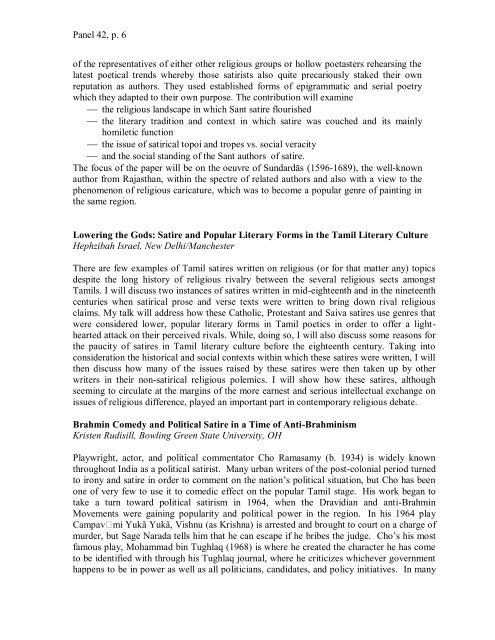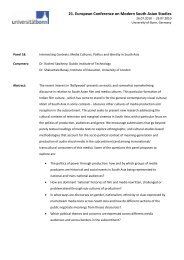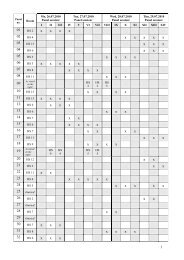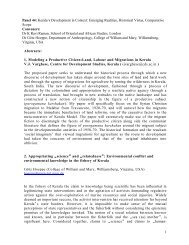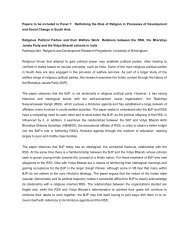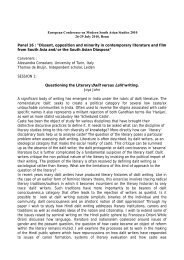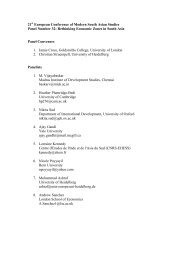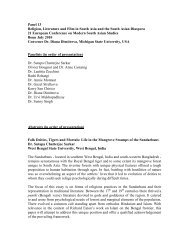Twenty-First European Conference for Modern South Asian Studies,
Twenty-First European Conference for Modern South Asian Studies,
Twenty-First European Conference for Modern South Asian Studies,
You also want an ePaper? Increase the reach of your titles
YUMPU automatically turns print PDFs into web optimized ePapers that Google loves.
Panel 42, p. 6<br />
of the representatives of either other religious groups or hollow poetasters rehearsing the<br />
latest poetical trends whereby those satirists also quite precariously staked their own<br />
reputation as authors. They used established <strong>for</strong>ms of epigrammatic and serial poetry<br />
which they adapted to their own purpose. The contribution will examine<br />
the religious landscape in which Sant satire flourished<br />
the literary tradition and context in which satire was couched and its mainly<br />
homiletic function<br />
the issue of satirical topoi and tropes vs. social veracity<br />
and the social standing of the Sant authors of satire.<br />
The focus of the paper will be on the oeuvre of Sundardās 1596-1689, the well-known<br />
author from Rajasthan, within the spectre of related authors and also with a view to the<br />
phenomenon of religious caricature, which was to become a popular genre of painting in<br />
the same region.<br />
Lowering the Gods: Satire and Popular Literary Forms in the Tamil Literary Culture<br />
Hephzibah Israel, New Delhi/Manchester<br />
There are few examples of Tamil satires written on religious (or <strong>for</strong> that matter any) topics<br />
despite the long history of religious rivalry between the several religious sects amongst<br />
Tamils. I will discuss two instances of satires written in mid-eighteenth and in the nineteenth<br />
centuries when satirical prose and verse texts were written to bring down rival religious<br />
claims. My talk will address how these Catholic, Protestant and Saiva satires use genres that<br />
were considered lower, popular literary <strong>for</strong>ms in Tamil poetics in order to offer a lighthearted<br />
attack on their perceived rivals. While, doing so, I will also discuss some reasons <strong>for</strong><br />
the paucity of satires in Tamil literary culture be<strong>for</strong>e the eighteenth century. Taking into<br />
consideration the historical and social contexts within which these satires were written, I will<br />
then discuss how many of the issues raised by these satires were then taken up by other<br />
writers in their non-satirical religious polemics. I will show how these satires, although<br />
seeming to circulate at the margins of the more earnest and serious intellectual exchange on<br />
issues of religious difference, played an important part in contemporary religious debate.<br />
Brahmin Comedy and Political Satire in a Time of Anti-Brahminism<br />
Kristen Rudisill, Bowling Green State University, OH<br />
Playwright, actor, and political commentator Cho Ramasamy (b. 1934) is widely known<br />
throughout India as a political satirist. Many urban writers of the post-colonial period turned<br />
to irony and satire in order to comment on the nation‟s political situation, but Cho has been<br />
one of very few to use it to comedic effect on the popular Tamil stage. His work began to<br />
take a turn toward political satirism in 1964, when the Dravidian and anti-Brahmin<br />
Movements were gaining popularity and political power in the region. In his 1964 play<br />
Campav mi Yukã Yukã, Vishnu (as Krishna) is arrested and brought to court on a charge of<br />
murder, but Sage Narada tells him that he can escape if he bribes the judge. Cho‟s his most<br />
famous play, Mohammad bin Tughlaq (1968) is where he created the character he has come<br />
to be identified with through his Tughlaq journal, where he criticizes whichever government<br />
happens to be in power as well as all politicians, candidates, and policy initiatives. In many


